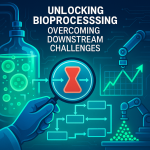📈 Vivian Ott will present how the Sartorius Ambr® 250 Modular bioreactor achieved impressive volumetric productivity.
🔍 Key points include the importance of small-scale processes, benefits of XCell® ATF technology, and its linear scalability for efficient manufacturing.
💬 A live Q&A will follow the presentations.
Introduction:
The article discusses a recent webinar focused on the advancements in monoclonal antibody (mAb) production leveraging perfusion-based processes at a 250 mL scale, utilizing the Ambr® 250 Modular system and Repligen’s XCell® ATF technology. The presentation emphasizes the importance of this approach for enhancing productivity and efficiency in bioprocessing for biopharmaceutical production.
- Perfusion processes enable higher cell densities, extended production runs, and increased volumetric productivity for mAb manufacturing.
- The presentation demonstrates that a small-scale mAb perfusion process can achieve outcomes comparable to traditional large-scale bioreactors.
- A continuous mAb production process over 23 days achieved a volumetric productivity of 0.65 g/L/day, showcasing the effectiveness of the proposed system.
- Attendees learned about the upstream process intensification benefits of XCell® ATF technology, which enhances productivity and reduces costs across various manufacturing scales.
- The importance of small-scale perfusion models in process development and seed train intensification was highlighted as a critical factor in ensuring manufacturability from development to commercial scale.
Conclusion:
The webinar illustrated the significant potential of perfusion-based mAb production processes, particularly at small scales, to meet the increasing demands of biopharmaceutical manufacture. The insights into XCell® ATF technology’s efficiency and cost-effectiveness underline the viability of implementing these processes in both development and commercial manufacturing scenarios, paving the way for advancements in bioprocess engineering.



